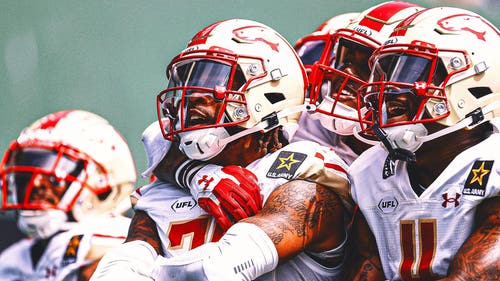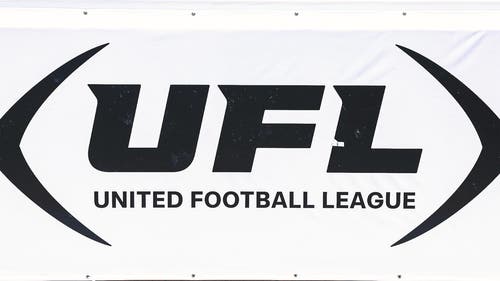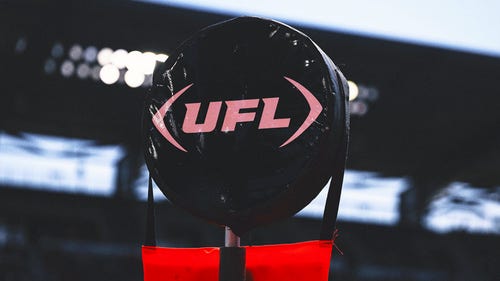
2024 UFL rules: Dean Blandino on what fans should watch for with new league
In its inaugural season, the United Football League will feature an innovation in rules that combines the best practices from the NFL, college football, USFL and XFL to create the best game experience for fans, players and coaches in 2024, the league announced Tuesday.
FOX Sports analyst Dean Blandino spoke to FOX Sports about what those fans should watch for, including why they will not see a team kick an extra point, the absence of a coin toss and how the clock will operate inside and outside the final two minutes of each half.
This interview has been edited for clarity.
Is there a rule or procedure here that the NFL has indicated it would like to see tested in the UFL?
There's been great collaboration between the NFL, XFL USFL and now with the United Football League. We actually had some meetings last week in New York with the NFL. We talked a little bit about what their experience has been with the 2023 regular season, what their Competition Committee is going to look like, and what they're going to look at going forward. And I'm excited about that communication.
Obviously, the kickoff is something the NFL is very interested in. You look at their numbers, and they've had less kick returns. They have a historic low in terms of kick returns for the NFL. Less than 21% of all kicks were returned.
So, I think they're interested in what we can do in the United Football League and testing different alignments, different roles around the kickoff, make it safer, and promote more kick returns. I think that's something we'll continue to look at and talk with the NFL about. The other thing is the technology testing. Whether it's ball tracking, wearables for the officials, maybe that's a watch, maybe that's eyewear that can help with monitoring what's happening with the play clock or the game clock.
Where will kickoffs begin and will anybody other than the kicker and returner be allowed to move before the returner catches the ball?
We wanted to try to incorporate parts of both XFL and USFL rules. It's gonna look more like the USFL kickoff where we'll be kicking off from the 20-yard line. Players will line up five to a side on the kicking team. They can run once the ball is kicked. Then I think we're looking at some of the other things that the XFL kickoff had in terms of touchbacks and blocking. So, it's gonna look more like a traditional kickoff.
But I think there are some rules in place where if the ball goes 20 yards untouched by the return team, it becomes more like a punt where the kicking team can't recover it and gain possession. So, I think it's going to look more like a traditional kickoff with some tweaks, and then we're going to just continue to monitor it. What's great is that we can look at each season and make changes and tweak and adjust based on what our experience has been. And so we're looking forward to seeing what the kickoff gives us for the 2024 season.
For an alternative to an onside kick, where will the ball be spotted and what is the down and distance?
It will be a fourth-and-12 from the 28-yard line. So a little bit different. The XFL was fourth-and-15 from the 25-yard line. The USFL was a fourth-and-12 from the 33-yard line.
It's a fourth quarter option only. It'll be a timed play, just like any other fourth down during the game. So if the score is tied, or the team that's going to put the ball in play is behind, they can elect to go for that fourth-down play. So we're excited about that. Obviously, both leagues had experience with that. There were some exciting plays, some exciting finishes that resulted from teams being successful on that fourth-down conversion.
The XFL did not allow kicking for the extra-point attempt. The USFL did. The UFL will adopt the XFL's rule. Why not allow teams to kick for their extra-point attempt?
There is no option to kick for an extra point. The UFL will have three options: You'll be able to get one point from the 2-yard line, go for two from the 5-yard-line, or you'll be able to go for three from the 10, and each attempt must be a run or pass play.
And so we like that. We had some really good conversations when we were looking at kind of melding these rules together. And the three-point try was great because it makes a nine-point game a one-score game. We want close games. We want that excitement at the end.
But, again, no kick tries. We will still have the kicking game with field goals and kickoffs, but for extra-point tries, it will only be run-pass.
Why is DPI not a spot foul like in the NFL (XFL) or a 15-yard penalty like in college (USFL)?
It'll be the college rule. It'll be 15 yards. If it's intentional, we'll be able to determine whether it's Mike Pereira or myself looking at it from the command center. If it's deemed intentional, then it would be a spot foul regardless of how far it was.
We had a lot of conversation about the NFL rule and the college rule for defensive pass interference. And there's pros and cons, right? There's the pro to having just a 15-yard gap. If you do have a marginal call, it doesn't cost the team 30 or 40 yards and field position. And most of the time, those are going to lead to points. Where the con would be if a player is just beat, and they're just going to foul intentionally, that team should get the 30 yards or what could be a touchdown that was taken away because the player just got tackled. That's why we feel the intentional aspect is important. We just want to have that ability to make it a spot foul if we deem that it's intentional.
How will the clock be managed inside the final two minutes of the half?
Outside of the last two minutes of each half, after an incomplete pass or the runner going out of bounds, the clock will stop initially, and then it will start, unlike the NFL where I think what we think of the best is it starts on the next snap for college football. It'll start when the play clock reaches 30 seconds, so that will basically start the game clock.
But after the two-minute warning, it'll be just like NFL or college football. You go out of bounds, the clock stops. It doesn't start until the next snap and incomplete passes would be the same thing. And then the one change inside two minutes — and both leagues did this last year — on a first down in the last two minutes the clock would stop. And if it's in the field of play, then it would start on the referee.
No coin toss?
No coin toss.
We did this in the XFL. The coin toss has always been a point of contention because it's just a 50-50. It's just arbitrary. And we felt that OK, look, you're gonna play an equal amount of games in the UFL. Everybody has five home games. Everybody has five road games. You're gonna get the advantage when you're at home. And when you're on the road, you're not, and you earn that advantage in the postseason when you have the home-field advantage.
So, the home team will have the option to defer or receive and that will be at the beginning of the game. The same will be true in overtime. We feel that's fair. You're not up to chance. You're at home, you know what your choice is going to be. And you know, when you're on the road, the other team gets the option.
A coach's challenge can be used on any type of ruling at any point in the game as long as the coach using the challenge has a timeout?
It'll be very similar where all the reviewable aspects of the play, whether that's catch-no-catch or the goal line or line-to-again, that will all fall under the command center. We'll be looking at that. If we see the incorrect ruling, we'll be able to change that. And we are going to let the coaches challenge once per game, and they're going to be able to challenge anything.
This is what we did in the XFL last year, where they can challenge any officiating ruling they want. They just have to have a timeout remaining to do so. And we really want the coaches to reserve that for something that is not reviewable. Don't challenge a catch-no-catch because we're looking at that. Don't challenge a touchdown ruling because we're looking at that. But if you think there was holding or if you think that the pass interference flag was incorrect, then you can challenge that. If we see that it's obviously what you're saying it is, then we'll make that change.
RJ Young is a national college football writer and analyst for FOX Sports and the host of the podcast "The Number One College Football Show." Follow him on Twitter at @RJ_Young and subscribe to "The RJ Young Show" on YouTube.










